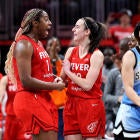
Throughout June and July and to commemorate the final year of the BCS era, Jerry Palm will be taking a year-by-year look at the machinations and controversies of the postseason system unleashed upon college football in 1998. Previous installments of the series can be found HERE.
Format: The championship game was the Fiesta Bowl. The regular Fiesta Bowl wasn’t played.
Number of bowls: 28. New bowls: Continental Tire, Hawaii and San Francisco, which was the new home of what was the Aloha Bowl.
Number of Division I-A teams: 117. New schools: None.
Conference realignment: UCF gave up independence and joined the MAC.
Formula changes: Since there was controversy in 2001, there was change again for 2002. This time, the goal was to change the formula to avoid the scenario that had prevented second-ranked Oregon from finishing No. 2. Since the Ducks were hurt by margin of victory in '01, the computers were changed again to have all eight ignore MOV as a factor. That meant saying goodbye to the rankings of Herman Matthews and David Rothman, who refused to change their rankings to suit the BCS, and hello again to the New York Times, which had a consultant come in and remove MOV from its old formula. Also, Peter Wolfe removed MOV from his rankings, and Jeff Sagarin created a new, non-MOV ranking for the BCS to use. That left seven computer rankings in the formula, so the computer average calculation went back to the old, goofy method of removing only the worst ranking for each team and averaging the rest.
Also, the quality win bonus was watered down so that bonuses were only given for wins over teams in the top 10 of the basic formula. That changed the scale from 1.5-0.1 to 1.0-0.1.
The goal was met. If this formula was in place in 2001, Oregon would have finished second. Ducks fans rejoiced. Or not.
The BCS was spared controversy in the selection of the championship game participants when both Miami and Ohio State finished undefeated and were the clear 1-2. The game itself … not so much. Miami appeared to have secured a repeat title by stopping Ohio State on fourth down in overtime. The fireworks even started to go off. But as that was happening, a flag came out. Miami was called for pass interference in the end zone. The officials butchered the mechanics of making that call so badly that nobody who doesn’t bleed Scarlet and Gray believes that was the correct call. Nobody, except the officials and me. I was standing at the goal line and saw it so clearly, I started reaching for my flag. It turns out I didn’t have one. The Buckeyes converted their second chance, then won the title in the next OT. That stands as the Big Ten’s only title of the BCS era. Miami was about to leave the Big East for the ACC. Neither of those leagues has been represented in the title game since.
While the determining of Nos. 1 and 2 was easy, there was some controversy over the at-large selections. USC became the first school to automatically qualify under the "Kansas State" rule, which was unfortunate. Since there was no nearby bowl for them to play in (the Fiesta had the title game, and the Rose didn't want an all-Pac-10 game), the Trojans ended up in Miami. The other at-large spot was considered to be between Iowa and Notre Dame until Big Ten commissioner Jim Delany said a week before selections that Iowa would be the choice. We're not sure if that had been decided by the committee or if Delany was simply exerting influence, but it did end up being Iowa. Iowa was third in the polls but only fifth in the BCS rankings. The Irish were outside the top 10 of the polls but ninth in the BCS. That would be the only time an eligible Notre Dame team was passed over.
If the soon-to-be-launched four-team playoff were in place: The fourth seed is a tough call. Iowa was third in the polls. The next highest-rated conference champion was Pac-10 co-champ USC, which was fifth in the polls but played the best schedule. USC did not play in the Rose Bowl because it lost a tiebreaker to Washington State, but I don’t believe that would matter to a selection committee. If Iowa’s only loss had come to Ohio State instead of to Iowa State, the Hawkeyes might have gotten the nod, anyway, but they didn’t play the Buckeyes.
Orange Bowl: No. 1 Miami vs. No. 4 USC
Cotton Bowl: No. 2 Ohio State vs. No. 3 Georgia
Peach Bowl*: Kansas State vs. Notre Dame
Sugar Bowl: Florida State vs. Texas
Fiesta Bowl: Michigan vs. Oklahoma
Rose Bowl: Washington State vs. Iowa
*- The Peach Bowl became the Chick-fil-A Bowl in 2006.




















